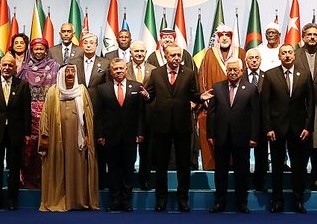Donald Trump, hypocrisy and the Holy Land
By Khaled Diab
In their reactions to Donald Trump's hypocritical Jerusalem declaration, many Arab and Muslim leaders have exhibited their own grotesque double standards.

Source: Recep Tayyip Erdoğan's Twitter account
Tuesday 19 December 2017
Exercising his peerless talent to make enemies and infuriate people, Donald Trump's decision to recognise Jerusalem as Israel's capital and move the US embassy there changes nothing on the ground – except perhaps highlighting the extent of American hypocrisy and how Washington was never an impartial broker.
Nevertheless, Jerusalem is a city of enormous symbolic significance, not just to Jews and westerners but also to Arab Muslims and Christians, and the Palestinian struggle has been at the heart of Arab and Muslim consciousness for generations.
This partly explains why a merely symbolic announcement from Trump has triggered such angry reactions both in Arab corridors of power and on the streets. Another factor is the need to forge a semblance of unity in this bitterly divided region.
Arab League foreign ministers warned that Trump's move “deepens tension, ignites anger and threatens to plunge the region into more violence and chaos,” as though it was not already mired in both.
In keeping with the League's track record of futile, toothless endeavours, the ministers said they would seek a UN Security Council resolution rejecting Trump's move, as though the US was not a veto-wielding permanent member.
Lebanon's foreign minister, Gebran Bassil, urged the Arab world to adopt economic sanctions against the United States. While Bassil was outspoken in his defence of Palestine, his position towards Palestinians is a different matter.
The foreign minister has previously stirred controversy with his opposition to the naturalisation of not only the recently arrived Syrian refugees but also the Palestinian refugees who have lived in Lebanon for decades. Bassil is even against allowing Lebanese women to pass on their nationality to their children if they are married to a Palestinian or a Syrian.
While Bassil is an extreme and bigoted example, loving Palestine but disliking the Palestinians is a fairly common dissonance in Lebanon. This is reflected in how angry protesters clashed with riot police outside the American embassy in Beirut, with some denouncing the US as the “enemy of Palestine”.
Meanwhile, nearly half a million registered Palestinian refugees call Lebanon home, many of whom live in poverty and socio-economic marginalisation, excluded from numerous professions, in one of the country's 12 Palestinian refugee camps, including the infamous Shatila in southern Beirut.
Of course, Lebanon has been a frontline state in the Arab-Israeli conflict. It has integrated some Palestinians and its failure to integrate the remainder partly rests on the fear of what this would do to the country's delicate balance of power, which dangerously and precariously hinges on a sectarian fulcrum. Some Lebanese are opposed to the integration of Palestinians on the grounds that this keeps the Palestinian cause alive, even if it exacts a heavy human cost.
At a rally in Beirut last week, Hizbullah leader Hassan Nasrallah, speaking by video link, urged Palestinians to rise up against Israel and vowed that “Jerusalem and Palestine and the Palestinian people and the Palestinian resistance in all its factions” would become his group's top priority.
One wonders why the Palestinians of Syria were not a priority for Nasrallah, whose militia has been actively supporting the Assad regime in its destruction of Syria, including Yarmouk, the Palestinian refugee camp in southern Damascus, upon which the regime and its allies have inflicted a cruel siege and fought a number of battles.
Not to be outdone, Turkey's Recep Tayyip Erdoğan vowed to lead Islamic efforts to resist the US move, even hosting a summit of the Organisation of Islamic Co-operation to prove his point. Calling Israel a “child-murderer state”, Erdoğan pledged to “continue our struggle within law and democracy… Our road map will show that it will not be easy for them to realize their plans.” What Erdoğan failed to mention is that he has almost destroyed Turkey's democracy and undermined the rule of law through a systematic campaign to jail journalists and critics and to purge the state of opponents and enemies, both real and perceived.
After the summit, Erdoğan pledged to open a Turkish embassy in East Jerusalem. However, he built a cunning escape hatch into his plan by claiming that he could not, for now, open this embassy, because East Jerusalem is under occupation. This sounds like low-risk grandstanding to me, as Turkey already has a consulate in Sheikh Jarrah. He could declare that the embassy, if he really wanted, and hang a sign outside, even if it pissed off the Israelis or led to the Israeli taking action against the consulate-cum-embassy.
The reason Erdoğan talks the walk but does not walk the talk is because of all the Turkish interests at stake. What is also absent from Erdoğan's inflammatory remarks is that, increasingly isolated like Israel's Binyamin Netanyahu, he ratified a lucrative reconciliation deal last year with Israel, the country he accused of infanticide.
While Turkey has longstanding official relations with Israel, Saudi Arabia, which severely reprimanded Egypt for its peace deal with Israel and ostensibly upholds the Arab boycott of Israel, is seeking closer ties, not to work towards peace and reconciliation in the Arab-Israeli conflict, but to build a mutual alliance against Iran, Riyadh's belligerent regional rival.
Regardless of which side of the Gulf spat they stand on, much of the Gulf Co-operation Council has been hungrily eyeing Israeli technology, with Saudi Arabia, the UAE and Qatar all finding covert paths, via middle countries, through which to import Israeli products, including military ones.
This, along with Saudi Arabia's hatred of Hamas and murderous starvation of Yemen, could explain the muted reaction from Riyadh compared with other Arab and Muslim capitals. Moreover, Saudi Arabia, under the de facto leadership of Crown Prince Mohammed bin Salman, is keen to build an axis of autocrats with wannabe dictator Donald Trump in Washington.
Egypt's reaction has also been fairly reserved. This is partly because of the mutual appreciation society President Abdel-Fattah al-Sisi enjoys with Donald Trump, and partly because Egypt has an ambivalent relationship with the Palestinians.
On the one hand, the Egyptian regime has helped Israel maintain its blockade of Gaza by keeping its Rafah crossing mostly closed and has stoked hatred and fear towards Hamas. On the other hand, Egypt has been a central mediator, though hardly an unbiased broker, in intra-Palestinian efforts to mend bridges, helping clinch the recent reconciliation accord between Fatah and Hamas.
Beyond the regimes, on the street, where outrage is generally more genuine, much of the anger has been on behalf of stones and symbols rather than flesh and blood humans, and has featured a troubling element of religious bigotry.
Over and above the chanting of tired and outdated slogans, there has been little in the way of creative new approaches to break the deadlock and support the Palestinians.
____
This is the updated version of an article which first appeared in German in Die Zeit on 14 December 2017.


